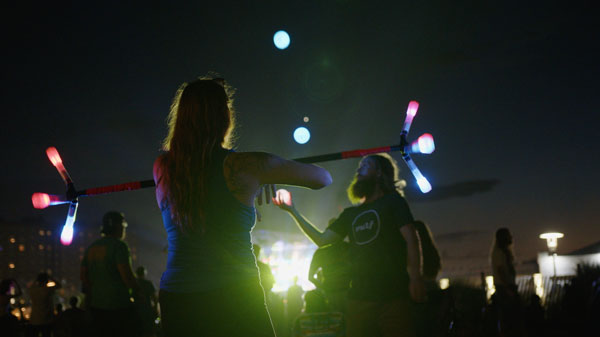
The Language I Speak is a feature length documentary that focuses on dialects in American culture. I had the distinct pleasure of sitting down with the filmmaker, Ana Curadra, for a Q&A session about the film and her approach to filmmaking. After listening to an interview on accents in New York City, Cuadra was inspired to start a project focused on accents and dialects in the United States. She started her research by going to an event at Georgetown University for sociolinguists, where she met most of the linguists she interviewed for the film.
The Language I Speak poses the question: What is proper English? And who speaks it? Cuadra answers this question in her documentary by deploying an ethnographic approach. By talking to sociolinguists and American citizens on the streets of New York City and elsewhere in the United States about how language shapes us and our perception of others, Cuadra weaves together a cohesive film about how our spoken language impacts us. What makes this film stand out is the way that Cuadra pieces the story together, starting with a broad topic like language and dialects then analyzing the different aspects of language and the socioeconomic impacts of it.
One section that I found to be especially intriguing was the section that focused on language development among children and babies. Jean Berko Gleason, sociolinguist and Professor Emerita, talks about how parents use gendered language when speaking to their children. Berko Gleason tells us that parents are more likely to talk about interpersonal relationships and feelings to their daughters than to their sons, which creates a fraction between the genders at such a young age. I also found the Mamie and Kenneth Clark doll test they showed to be extremely interesting, as it illustrated how developing minds internalize not only gendered but racialized language that is harmful to their mental well-being.
Another section that changed my way of thinking was the section that focused on the relationship between race and language. Dr. Sharese King, a social linguist from the University of Chicago, also provides interesting insights about the relationship between race, place, and language variation by exploring how African Americans use language to construct multi-dimensional identities and how these constructions are perceived and evaluated across different listener populations. She tells us that people don’t analyze language according to who’s right or wrong, but rather what is it that people produce and do people in the communities they are speaking understand it. Linguist and Professor at North Carolina State University specializing in social and ethnic dialects of Urban African American English, Walt Wolfram, builds on this idea by saying, “If your group is socially subordinate, then your language will be considered no good.”










